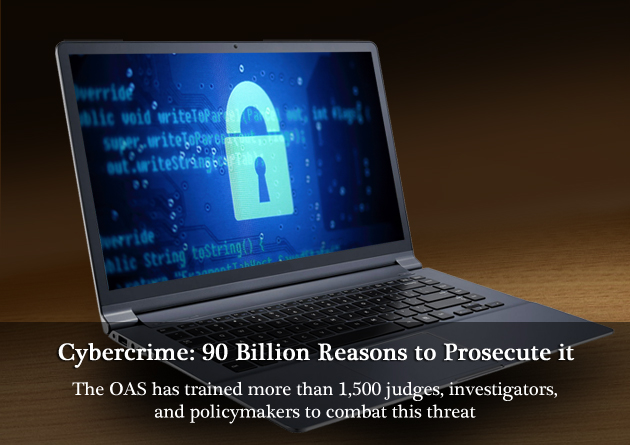- English
- Español
Media Center
Feature

Last century’s technology boom brought about countless advances for mankind, but also another set of challenges for policymakers, legislators, and investigators of the Americas, who have had to increasingly focus on the prosecution and punishment of cybercrimes such as child pornography, identity theft, cyberbullying, or computer hacking. The Latin America and Caribbean Network Information Centre (LACNIC), which oversees the Regional Internet Registry for Latin America and the Caribbean, estimates that cybercrime costs our region about 90 billion dollars annually.
This is why, in 1999, the Ministers of Justice and Attorneys General of the Americas convened a group of experts within the framework of the Organization of American States (OAS) in order to:
Assess criminal activity targeting computers and information in the member states;
Evaluate legislation, policies, and national practices related to cybercrime;
Identify international and national institutions with relevant experience in the matter; and
Seek cooperation mechanisms to combat this threat.
Today, this entity is known as the Working Group on Cybercrime of the Meetings of Ministers of Justice, or Other Ministers, or Attorneys General of the Americas (REMJA). It meets twice a year to improve and strengthen legal and judicial cooperation among the states of the Hemisphere.
The assessment that came out of this process revealed that perhaps the greatest difficulty facing the countries of the region is the lack of agencies specialized in cybercrime that have the authority to investigate and prosecute the perpetration of this crime, as well as the lack of sufficient training to further advance in a comprehensive and coordinated effort.
In response to this challenge, the OAS, with the support of various countries in the region, decided to start developing workshops and programs to train judges and magistrates of the judiciary in the content and scope of international conventions and agreements on cybercrime. Training also included other available legal instruments, the management of digital evidence, and the importance of international legal cooperation for the prosecution and punishment of this crime.
Through this initiative, more than 1,500 judges, investigators, and legislative policymakers have been trained in 26 regional workshops coordinated by the OAS. The workshops have covered topics such as basic investigation techniques and prosecution; management, conservation and admissibility of electronic and digital evidence; international cooperation and mutual legal assistance; and techniques for developing legislation on cybercrime based on the European Council’s Convention in this matter.
This week, training workshops on these topics are being provided to 50 judges and magistrates of the judiciary branch of Argentina, Paraguay, Uruguay, and Chile, who will participate in an exercise on legal cooperation in cybercrime in Buenos Aires.
In these exercises, participants identify common examples of cybercrimes that occur in their countries and the challenges they face: they learn about the Inter-American Cooperation Portal on Cybercrime that the OAS developed and information on data open sources focused on the investigation of cybercrime, metadata and reverse lookups; and they receive training on the basic elements of digital evidence and how to secure and ensure the proper preservation of the custody chain. Furthermore, they discuss the necessary balance between privacy and security, as well as the legal aspects of digital evidence and the formal and informal ways to obtain them.
The workshop in Buenos Aires, intended for the countries of the southern cone, is the first in a series that will be carried out throughout 2016 in the entire region of Latin America and the Caribbean. The workshop intended for Central American countries will take place in Costa Rica in July; the one for Caribbean countries will be held in Fort Lauderdale, USA, in August, and the one for the Andean region in Peru in October.
Since its inception, the Working Group on Cybercrime has served as facilitator for the exchange of information and experiences and for making recommendations aimed to improve and ensure effectiveness in the fight against this crime in the region.
In addition to its fight against cybercrime, the OAS, through the Inter-American Committee against Terrorism (CICTE) and the Inter-American Telecommunication Commission (CITEL), fosters specific programs to prevent and mitigate cybercrime threats, which are particularly focused on building security capacities between states, establishing national “alert, monitoring and prevention” groups, developing national strategies on cybersecurity, critical infrastructure protection plans, and overall cyberspace security.
Reference: E-063/16


